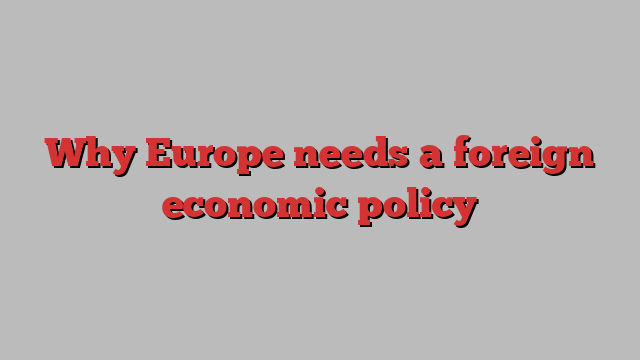
Unlock the Editor’s Digest for free
Roula Khalaf, Editor of the FT, selects her favourite stories in this weekly newsletter.
All foreign policy is in part economic. Most economic policy is also of geostrategic import. These basic facts are well appreciated in Washington and Beijing. Not so in the capitals of Europe.
That is why, of the numerous thoughtful proposals in Mario Draghi’s report on European productivity, none is as intriguing or potentially far reaching as his call for a European “foreign economic policy”. The very realisation that none exists is a step forward.
What would it mean for the EU to have one? Most obviously, that even domestic economic policy would be made in light of geostrategic goals. Draghi explains such policy as “statecraft . . . to co-ordinate preferential trade agreements and direct investment with resource-rich nations, build up stockpiles in selected critical areas, and create industrial partnerships to secure the supply chain of key technologies”.
The need for such statecraft goes much further than Draghi’s focus on securing critical resources, to green industrial policies broadly and beyond.
For example, the EU’s new carbon tariffs have incentivised other jurisdictions to adopt carbon-pricing schemes of their own. Yet this effect, very much in the EU’s interest, is an afterthought rather than the policy’s principal purpose. (That was to prevent green European industry from being undercut by carbon-intensive imports.) It was more happy coincidence than statecraft.
New EU rulemaking on supply-chain sustainability (over deforestation, for example) has caused diplomatic frictions, with trade partners seeing it as protectionist. This caught Europeans unawares — something a foreign policy perspective could have avoided.
The point is not that such a perspective would or should have tempered the pursuit of domestic goals. On the contrary, placing geostrategic considerations at the centre of domestic economic decision-making would more often than not raise the level of ambition.
Take the European Central Bank’s work on a digital euro. It has largely focused on effects on the Eurozone’s domestic monetary system — which has led to a consensus on tight limits on the digital euro amounts anyone could hold to protect legacy banks’ business models. A foreign policy perspective would lift the euro’s international role and the strategic advantages it could bring. It would thus emphasise that letting foreign users hold ample digital euros easily would encourage euro invoicing in international trade, and tie other economies more strongly to the EU’s.
Similarly, a foreign policy perspective would inject much-needed urgency into the projects to unify EU banking and financial markets. National divisions sap Europe’s collective economic strength and increase its dependencies on other countries.
The issue of decarbonising Europe’s car fleet is where an EU foreign economic policy approach is most starkly needed. It should be obvious that EU countries need both a larger inflow of Chinese electric vehicles in the cheaper segment and also a sufficiently large domestic market for EU carmakers to confidently make the investments necessary to ramp up their own EV production capacity.
This requires a combination of policies: a managed openness to Chinese imports, a much stronger tilt of consumer subsidy and procurement policies towards EU-produced EVs, and an overall quantitative judgment of how much of each is optimal. Crucially, that judgment must be explicitly calibrated against what Beijing is willing to do in return. The obvious asks are for China to use more of its soaring EV production capacity itself and reduce its complicity in Russia’s egregious violation of Ukraine’s sovereignty.
Such joined-up policymaking is only possible if foreign policy and domestic economic and industrial policy are made as one. Simply put, that means Kaja Kallas — the EU’s incoming top foreign policy official — must be involved in decisions about taxation of corporate vehicles, and decision-making on EU’s capital markets and banking union must keep foreign ministers in the loop.
The structure of the EU discourages that. Commission president Ursula von der Leyen has tried to overcome this through an extreme centralisation of decision-making, but that is politically unsustainable outside the most acute crises. The make-up of her new commission suggests a welcome attempt to institutionalise joined-up thinking.
But that leaves national leaders who ultimately hold the most power in the EU. Realising an EU foreign economic policy requires enough national leaders to jointly make economic policy with collective strategic goals in mind. Europe will become strong in national capitals or not at all.